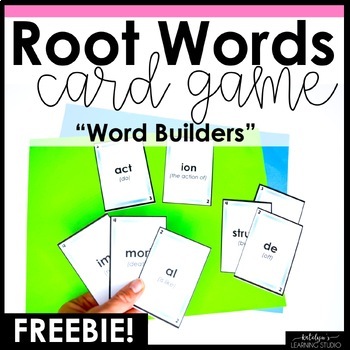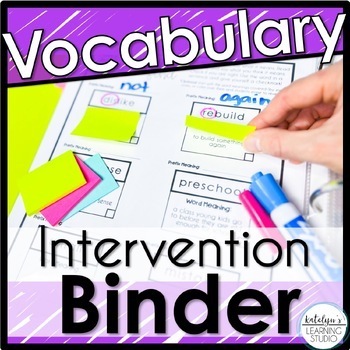8 Great Vocabulary Activities and Games for Building Word Understanding
Want to help your students have fun while building word understanding? Use these FUN vocabulary activities and games to make learning new vocab words enjoyable for your kiddos. I promise you– the more fun they have while learning vocabulary, the more the new words will STICK!
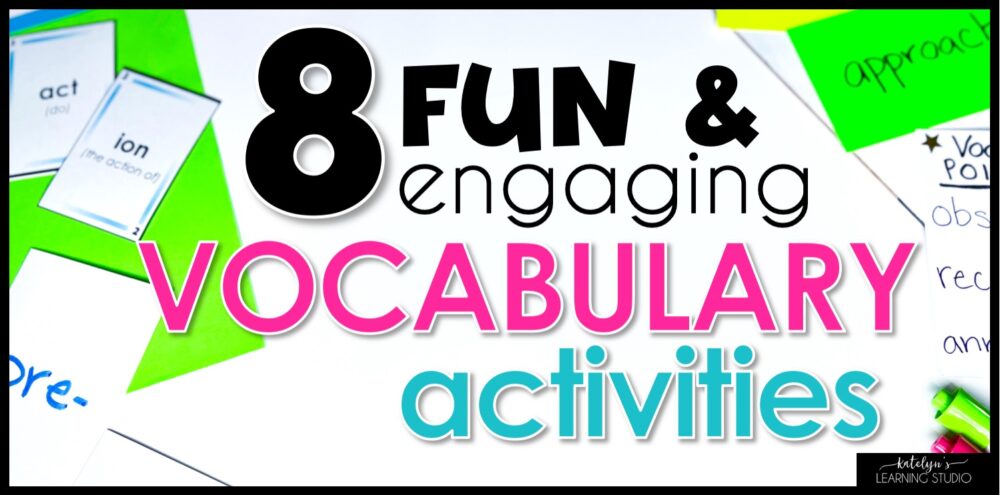
These vocab games are the perfect way to build vocabulary for students in a fun way!
Why is it so important to build their vocabulary word understanding?
The more words they know…
- the better they will understand what they read
- the more confidence they will have when speaking and expressing their ideas
When students build their bank of vocabulary words, comprehension soars through the roof!
Here is a blog post that dives deeper into vocab skills and what teaching vocabulary looks like.
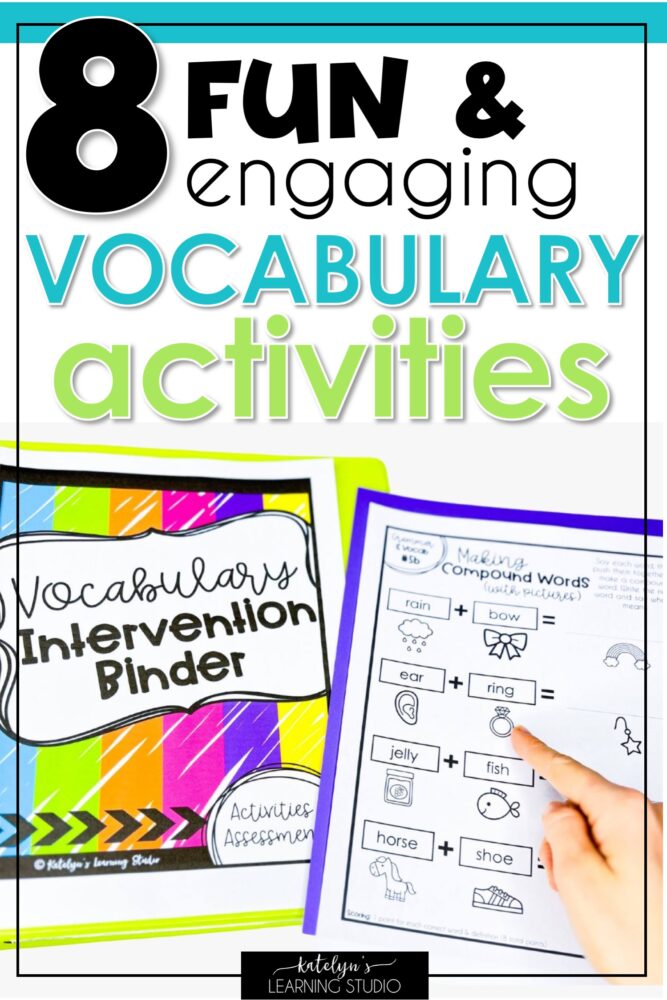
These fun vocabulary activities will help your kiddos have fun while learning new words! Pictured is my Vocabulary Intervention Binder you can grab here.
8 Fun Vocabulary Activities & Games
Each of these fun vocab activities targets key vocabulary skills and academic vocabulary, while still focusing on engagement and making a game out of it. Your kids will love them!
You can find more vocabulary activity ideas in my blog post 7 Awesome Vocabulary Strategies.
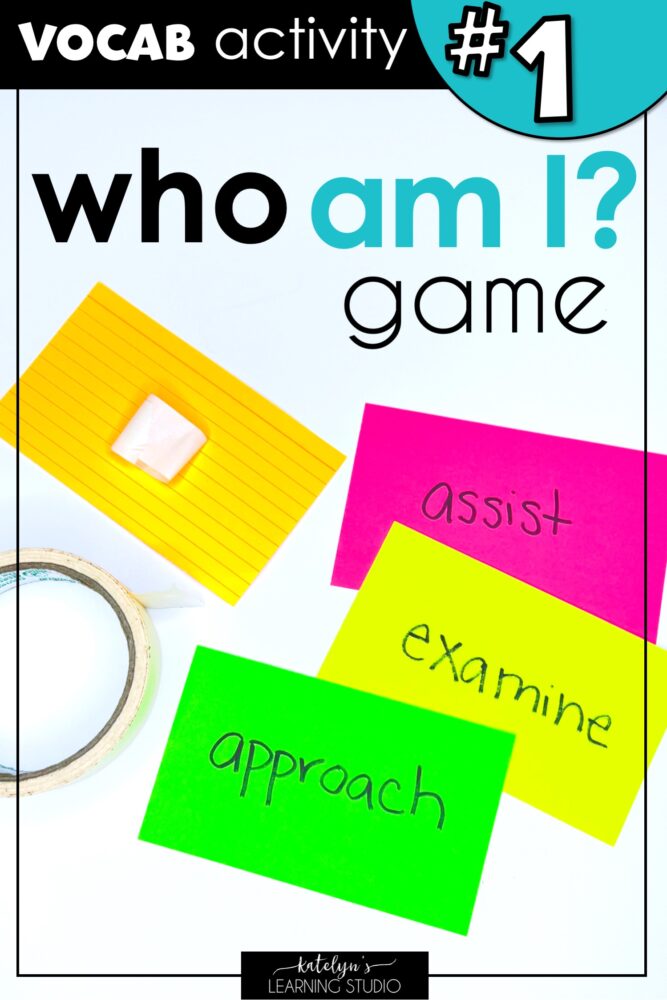
When teaching vocabulary, get students up and moving with this “Who am I?” game.
1. Vocab “Who am I?” Game
This is such an easy game that is so versatile with any vocabulary list!
- Write vocabulary words on notecards.
- Tape a word to each student’s back (without them seeing the word)
- Have students “mingle”.
- They can either:
- Ask yes or no questions to figure out what their word is
- Or the person they talk to can use the word in a sentence (saying “blank” in place of the word)
- When the student thinks they know what the word is, they can go to the teacher, say the word, and use the word in a sentence.
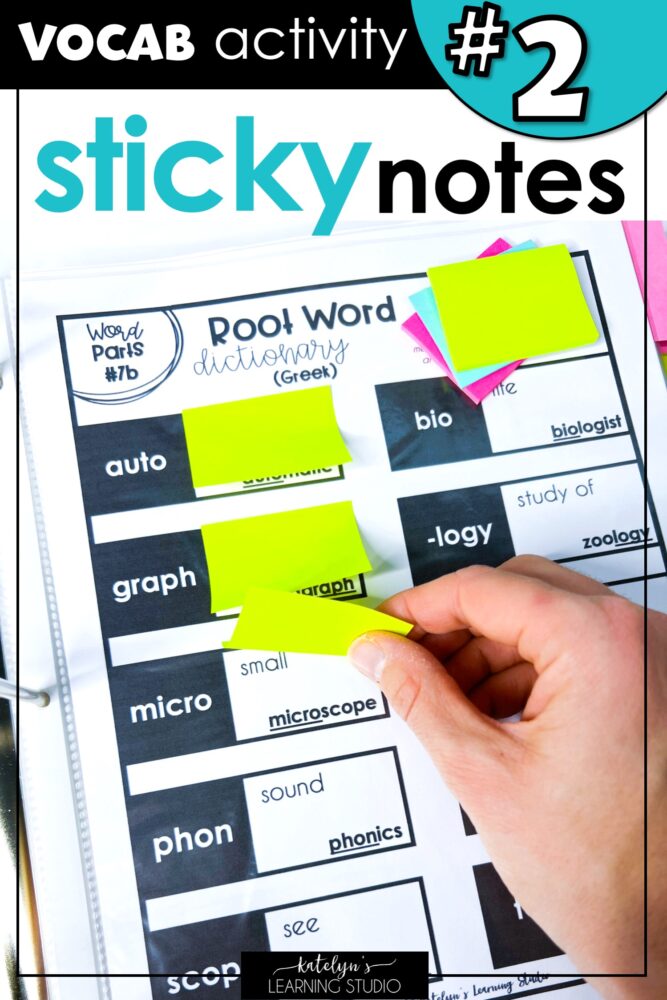
Add sticky notes to your vocabulary building activities to make them instantly more hands-on and engaging, like with this activity in my Vocabulary Intervention Binder.
2. Use Sticky Notes in your Vocabulary Activities
Sticky notes are one of the ultimate low-prep but engaging teaching tools!
They add…
- Tactile input (sticking & pulling them off)
- Kinesthetic input (moving them around)
- Visual input (bright colors/color coding, drawing attention, hide & reveal)
- Hands-on interactive engagement!
Plus they are so easy to stick (haha, no pun intended) into any lesson without adding extra work.
*Side note: for more ideas on adding multisensory learning into your reading instruction, here is my Ultimate List of Reading Intervention Activities and 6 Fun Multisensory Learning Activities.
Here are some ideas for using sticky notes in your vocabulary activities:
- Definition Cover-Up:
- Have a list of words/root words and definitions
- Cover either the words or the definitions with sticky notes
- Have students say the word/definition that matches, then check if they are right
- Great for self-assessment!
- Memory
- Have a memory board of words and definitions
- Cover them all with sticky notes
- Let students take turns taking off 2 sticky notes at a time to uncover matches
- If they find a match, go again. If they don’t, re-cover the words and it’s the next player’s turn.
- Build words
- Write word parts on sticky notes (prefixes, root words, suffixes)
- Let students rearrange sticky notes to make new words (real or made up!)
- Labeling
- Write words on sticky notes (or let students write the words)
- Let students stick them around the room to label things
- You can also have pictures on a piece of paper and use small sticky notes with matching words for students to stick on the pictures.
I have tons of sticky note activities in my Vocabulary Intervention Binder to make intervention more engaging!
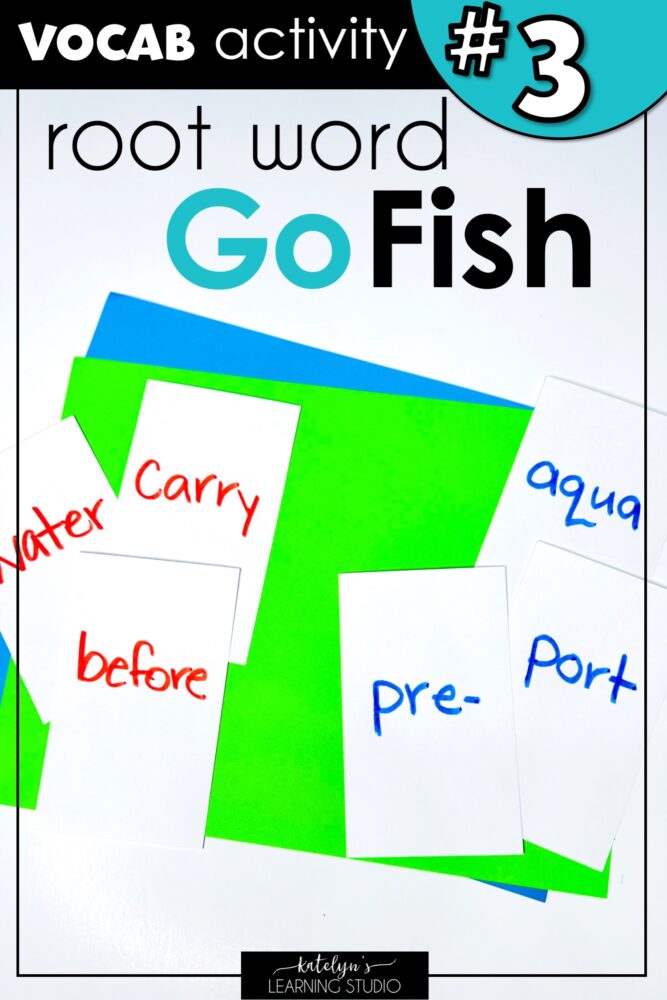
Turn the classic Go-Fish into a vocabulary games learning opportunity!
3. Root Word Go-Fish Vocab Game
A vocabulary twist on a classic game! Most kids already know how to play Go Fish, so this is an easy one to learn. Plus, the focus on root words is an AWESOME way to equip students with the tools to tackle big words!
Learning root words is a fantastic vocabulary booster, and it prepares students to learn how to decode multisyllabic words.
Set Up (for 2 players):
- Get 20 different note cards (or more for more players or to practice more roots!)
- Choose 10 root words to focus on.
- Write one root word on each of 10 cards.
- Write the meanings on each of the other 10 cards.
Game Play:
- Shuffle the cards and place the stack face down in the middle of the players.
- Hand 5 cards to each player.
- Players can put down any root + meaning matches.
- At the beginning of your turn, draw a card from the pile.
- Take turns asking for a root or a meaning from the other person.
- If the other person has the card you ask for, they give it to you. If not, it’s the next player’s turn.
- If you get a card that makes a match, put the match down in front of you.
- Keep playing until someone runs out of cards.
- The person with the most matches wins!
*Variations: Instead of matching root words and meanings, you can match…
- root words with a whole word that has that root
- words (that contain root words) with definitions
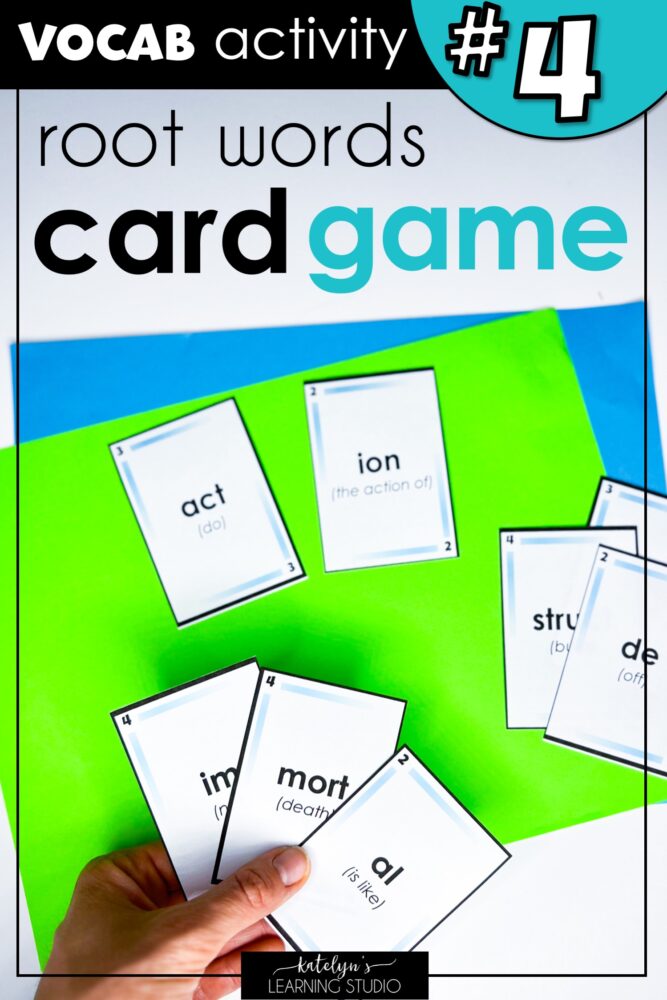
Vocabulary games like this FREE root words card game make learning more fun!
4. Word Builder Vocabulary Game:
This is a fun take on the traditional card game called “Rummy”. You can buy pre-made Rummy Roots cards, or just print out these similar {FREE} Word Builder cards.
Set-Up:
- Shuffle and deal everyone 5 cards.
- Place the deck face down in the middle.
- Flip the top card over face up next to the deck (this is now your discard pile).
Game Play:
- Player 1 can either draw one card from the deck, or take the top card from the discard pile.
- If they can make any word from the word bank with their root cards, place that word down face up in front of them.
- Their turn ends by discarding one card into the discard pile (face up right next to the deck).
- The next player can either take the top card of the discard pile, or draw a card from the deck
- When one player lays down all of their cards, the game is done.
Scoring:
- Add up all of the points from the words you made.
- Subtract any points from cards left in your hand.
- The player with the most points wins!
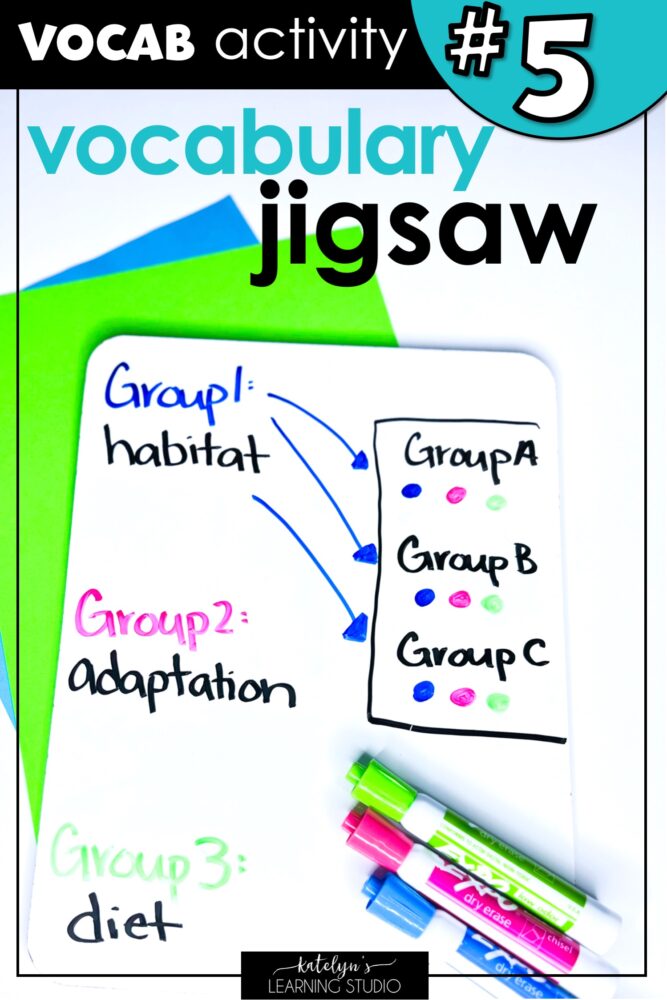
Have students teach the vocab words in this reciprocal teaching activity.
5. Jigsaw Vocabulary Activity
This is a great vocabulary activity to let students do the teaching and learn from their peers. It is a great confidence boost, and teaching is one of the best ways to learn something in long-term memory!
Instructions:
- Split the class into 4-5 groups.
- Give each group an assigned word.
- Let each group research their word together to become experts on it (find it in a dictionary, draw pictures of it, come up with synonyms and antonyms, use it in a few sentences, etc.)
- Then rearrange the groups so that each new group has 1 student expert for each word.
- Let students take turns teaching their new group their word.
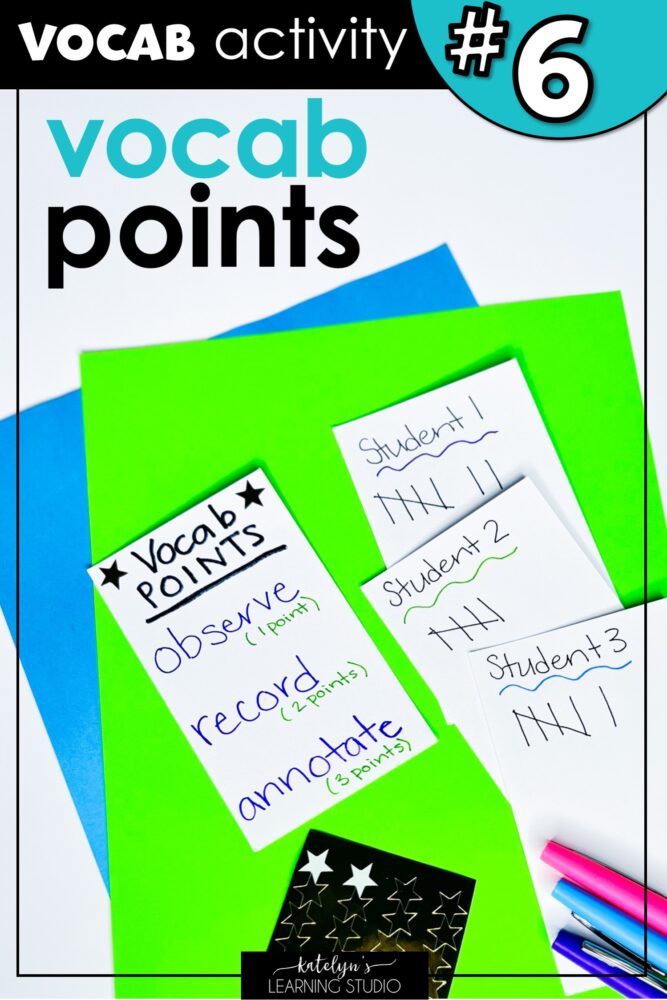
Vocabulary activities for kids don’t have to be complicated. Try this simple points game!
6. Vocabulary Points Game
This is a great motivator for actually USING new vocabulary words learned! And the more they use their new vocab words, the more the meaning will become solidified in their natural language.
- Choose 5 vocabulary words for the week and display them on the wall.
- Teach students what each one means and give examples of using them in a sentence.
- Each time you hear a student using one of the words in a sentence the correct way, they get a point.
- See how many points students can accumulate over the week!
Optional: if a student (or the class as a whole) hits a certain number of points, they get a prize.
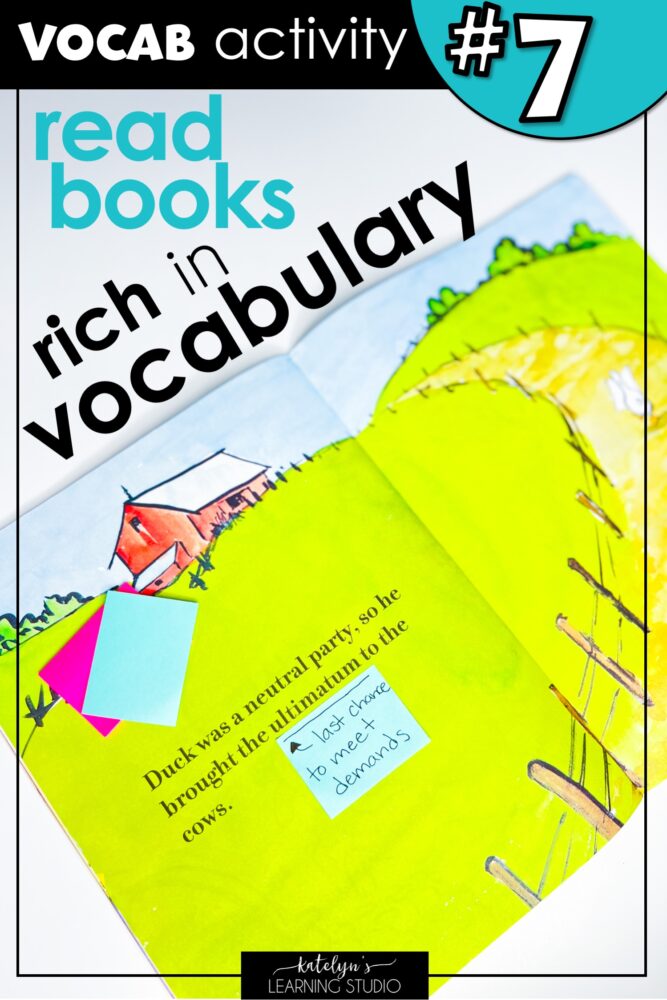
Teaching vocabulary words you find in books is a great real-word example of natural vocabulary building.
7. Read Books Rich in Vocabulary
Books and read-alouds are such great opportunities for learning new words in context. Read high-quality books with rich language and vocabulary.
- When you come across a new, interesting, or meaningful word–talk about it!
- Write it out so the students can see it.
- Re-read the sentence it is in.
- Ask students to use context to say what they think it means.
- Use it in additional sentences to model it’s meaning.
- Give synonyms and antonyms for it.
- Let students use it in their own sentences.
No, don’t do this for every word of the story itself will lose its impact and flow. BUT, be sure to do this for the particular words you want to teach your students (at least one per read aloud session).
Here is an Amazon (affiliate) link to all of my favorite high-quality books arranged by reading level.
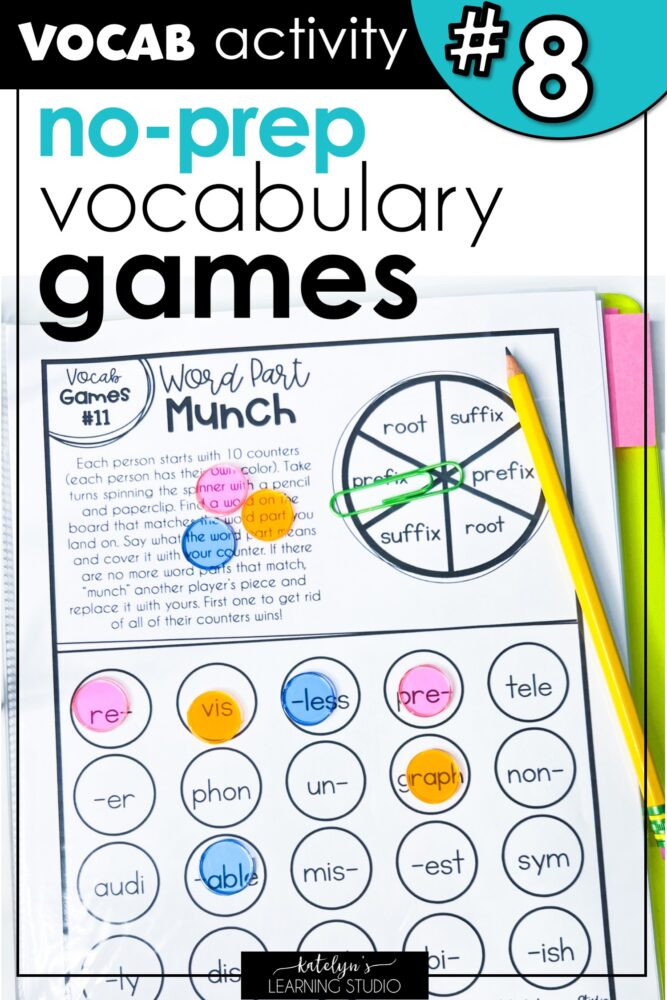
These vocabulary word games printable activities are perfect for no-prep practice! Check them out in my Vocabulary Intervention Binder.
8. No-Prep Vocabulary Games (+ Vocabulary Activities Binder)
These fun vocabulary games are PERFECT for easy, instant engagement. Just print them out and use them as a vocabulary enriching center, mini-lesson, or fast-finisher!
You can find these vocab games in my Vocabulary Intervention Binder.
The binder includes loads of print-&-teach intervention activities to cover basic vocabulary skills, grammar, root words and affixes, and context clues.
Plus, there is a whole section of these no-prep games to cover all of those topics!
They include:
- Definition Memory
- Mystery Descriptions
- Categories
- Category Guess
- Parts of Speech Roll-It
- Compound Word Maze
- Synonym Board Game
- Antonym Catch a Star
- Homophone Memory
- Homograph Board Game
- Word Part Munch
- Word Part Bingo
- Mystery Words
This is a super fun and easy way to ramp up vocabulary lesson engagement!
I hope these vocabulary activities and games have sparked some ideas of fun ways to build your students’ language confidence and word understanding! Vocabulary building activities are a great way to have fun while still learning new vocab words and skills.
